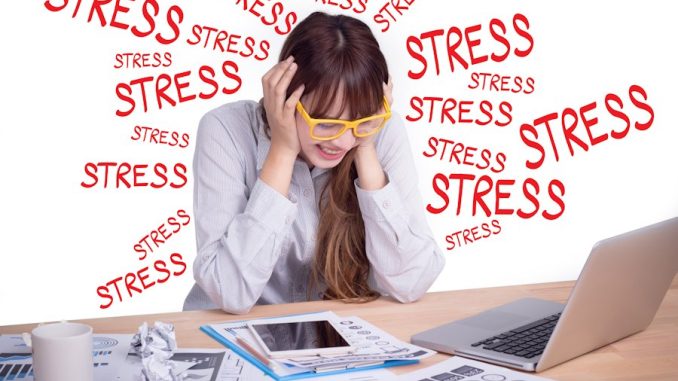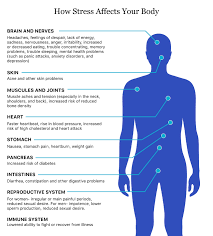
Stress can manifest in various ways, and the symptoms can differ from person to person. Here are some common symptoms of stress:
- Physical symptoms:
- Headaches or migraines
- Muscle tension or pain
- Fatigue or low energy levels
- Sleep problems, such as insomnia or oversleeping
- Digestive issues, such as stomachaches, nausea, or diarrhea
- Changes in appetite (overeating or loss of appetite)
- Increased heart rate or palpitations
- Sweating or clammy hands
- Weakened immune system, leading to frequent colds or infections
- Emotional and behavioral symptoms:
- Feeling anxious, worried, or overwhelmed
- Irritability or mood swings
- Restlessness or difficulty relaxing
- Lack of motivation or focus
- Racing thoughts or constant worrying
- Difficulty making decisions
- Changes in eating or sleeping patterns
- Social withdrawal or isolation
- Increased use of alcohol, drugs, or tobacco
- Nervous habits like nail biting, teeth grinding, or pacing
- Cognitive symptoms:
- Memory problems or forgetfulness
- Difficulty concentrating or making decisions
- Racing thoughts or constant worrying
- Negative thinking or pessimism
- Poor judgment or lack of perspective
- Mental fatigue or feeling overwhelmed
- Reduced creativity or problem-solving abilities
It’s important to note that these symptoms can also be indicative of other medical conditions. If you’re experiencing persistent or severe symptoms, it’s advisable to consult a healthcare professional for an accurate diagnosis and appropriate treatment.
In today’s fast-paced world, chronic stress is commonplace, but your mind and body can pay a heavy price. Learn to recognize overwhelming stress—and what you can do about it. Symptoms of stress are as under.
Young woman with hand on forehead and arm holding pillow sitting with legs folded on sofa, stressed facial expression
Stress is how the body responds to any kind of demand or threat. When you sense danger—whether real or imagined—the body’s defenses kick into overdrive in a quick, automatic process known as the “fight or flight” or “stress response.”
What is stress?

The stress response is the body’s way of protecting itself. When it works properly, it helps you stay focused, energized and alert. In an emergency, stress can save your life – for example, giving you extra strength to defend yourself or forcing you to brake hard to avoid a car accident.
Stress can have other positive aspects, sometimes referred to as “eustress”. For example, it can help you overcome challenges such as staying on your toes during a presentation at work, sharpening your focus when attempting a game-winning free kick, or guiding you to study for an exam when… I’d rather be watching TV. SYmptoms of stress are very easy to understand.
But while not all stress is bad for you, beyond a certain point it stops being helpful and starts causing serious damage. Stress that seems overwhelming can have a negative impact on health, mood, productivity, relationships and quality of life.
If you often feel dizzy and overwhelmed, it’s time to take action to bring your nervous system back into balance. You can protect yourself – and improve your thinking and well-being – by learning how to recognize the signs and symptoms of chronic stress and take steps to reduce its harmful effects.

Eustress vs. distress
It can be helpful to think of stress as a spectrum. On the one hand, you have “eustress”, manageable levels of stress that can motivate you to face challenges at work, school or in your personal life. While eustress can take you out of your comfort zone, it can help you succeed on a job interview or first date, for example, or complete a project at school or work that involves stretching and learning new skills.
On the other end of the spectrum is “distress,” stress that makes you feel overwhelmed and that can lower your mood and outlook, disrupt sleep, and trigger health issues like depression and anxiety. Suffering occurs when you feel you are more stressed than you can handle, whether it’s from feeling too busy at work, lack of money, illness or bereavement.
Your individual perception of stress often influences whether you experience eustress or distress in a given situation. For example, if you’re feeling worried, exhausted, and overwhelmed by an upcoming work deadline, you may feel anxious. On the other hand, if you feel excited that meeting a deadline can positively impact your career, the stress you experience may be more motivating and helpful.
Work Of Stress And Its Effects
When you feel threatened, your nervous system responds by releasing a flood of stress hormones, including adrenaline and cortisol, which spur your body into emergency action. Your heart beats faster, your muscles tense, your blood pressure rises, your breathing quickens, and your senses become heightened. These physical changes increase your strength and stamina, speed up your reaction time, and improve your concentration—preparing you to fight or flee from danger.

Effects of chronic stress
Your nervous system is not very good at distinguishing between emotional and physical threats. If you’re extremely stressed over an argument with a friend, a work deadline, or a mountain of bills, your body may react just as strongly as if you were faced with a real life or death situation. And the more your emergency stress system is activated, the easier it gets to kick in, making it harder to turn off.
If you are often stressed, like many of us in today’s demanding world, your body may be in a state of increased stress most of the time. And this can lead to serious health problems. Chronic stress disrupts almost every system in your body. It can suppress the immune system, impair the digestive and reproductive systems, increase the risk of heart attack and stroke, and accelerate the aging process. It can even rewire your brain, making you more susceptible to anxiety, depression, and other mental health issues.
- Health problems caused or exacerbated by stress include:
- Depression and anxiety
- Pain of any kind
- Problems with sleeping
- Autoimmune diseases
- Digestive problems
- Skin conditions such as eczema, stress rash or hives
- Heart disease
- Weight problems
- Reproductive issues
- Problems with thinking and memory

Signs and symptoms of stress
The most dangerous thing about stress is how easily it can attack you. You’ll get used to it. It starts to feel familiar, even normal. You don’t notice how much it affects you, even if it takes a heavy toll. That’s why it’s important to be aware of the common warning signs and symptoms of stress overload.
- Cognitive symptoms:
- Problems with memory
- Inability to concentrate
- Bad mark
- Seeing only the negatives
- Anxious or racing thoughts
- Constantly worrying
- Emotional symptoms:
- Depression or general unhappiness
- Anxiety and agitation
- Mood, irritability or anger
- feel honored
- Loneliness and isolation
- Other mental or emotional health problems
- Cognitive symptoms:
- Problems with memory
- Inability to concentrate
- Bad mark
- Seeing only the negatives
- Anxious or racing thoughts
- Constantly worrying
Causes of stress
Situations and pressures that cause stress are called stressors. We tend to think of stressors as negative, such as a grueling work schedule or a difficult relationship. However, anything that puts high demands on you can be stressful. This includes positive events such as getting married, buying a home, going to college or getting a promotion.
Of course, not all stress is caused by external factors. Stress can also be internal or self-generated when you worry excessively about something that may or may not happen, or have irrational, pessimistic thoughts about life.
Finally, what causes stress depends, at least in part, on how you perceive it. Something that is stressful for you may not bother someone else; they may even enjoy themselves. While some of us are afraid to stand in front of people to, for example, perform or speak, others live for the spotlight. Where one person thrives under pressure and performs best in the face of tight deadlines, another shuts down when job demands increase. While you may enjoy helping care for your elderly parents, the responsibilities of caring for siblings can be overwhelming and stressful.
Common external causes of stress include:
Major changes in life
- Work or school
- Relationship difficulties
- Financial problems
- Being too busy
- Children and family
- Common internal causes of stress include:
- Pessimism
- Inability to accept uncertainty
- Rigid thinking, no flexibility
- Negative internal dialogue
- Unrealistic expectations/perfectionism
- The “all or nothing” attitude.
Stressful life events
According to the widely validated Holmes and Rahe Stress Scale, here are ten of the most stressful life events for adults that can contribute to the disease:
- Death of a spouse
- Divorce
- Separation
- Confinement
- Death of a close family member
- Injury or disease
- Marriage
- Losing job
- marital reconciliation
- Pension
- What’s stressful for you?
- Regardless of the stressful event or situation, there are ways to deal with the problem and regain balance. Some of the most common sources of stress in life include:
While some workplace stress is normal, excessive stress can interfere with your productivity and performance, affect your physical and emotional health, and affect your relationships and home life. It can even determine the difference between success and failure at work. Whatever your ambitions or job demands, there are steps you can take to protect yourself from the damaging effects of stress, increase job satisfaction and improve your well-being in and out of the workplace.
Stress at work
Job loss and unemployment stress
Losing your job is one of the most stressful experiences in life. It’s normal to feel angry, hurt, or depressed, mourn everything you’ve lost, or worry about what the future holds. Job loss and unemployment bring many changes at once that can shake your sense of purpose and self-esteem. While stress can seem overwhelming, there are many steps you can take to come out of this difficult time stronger, more resilient, and with a renewed sense of purpose.
Financial stress
Many of us, from all over the world and from all walks of life, are dealing with financial stress and uncertainty during this difficult time. Whether your problems stem from job loss, mounting debt, unexpected expenses, or a combination of factors, financial worries are one of the most common stressors in modern life. However, there are ways to get through these difficult economic times, relieve stress and anxiety, and regain control of your finances.
Pension
No matter how much you look forward to it, retirement can bring both stress and benefits. Escape from the daily grind and long commute can feel like a great relief at first. But after a few months, you may lose the sense of identity, meaning, and purpose that came with work, the structure it gave your days, and the social aspect of having co-workers. To help you weather the stress of retirement, there are healthy ways to make changes and cope with this major life change.
Caregiver stress
The demands of care can be overwhelming, especially if you feel you are overreacting or have little control over the situation. If caregiving stress is left unchecked, it can take a toll on your health, relationships, and state of mind – ultimately leading to burnout. However, there are many things you can do to stave off the stress of caring and regain a sense of balance, joy and hope in your life.
How Much Stress Is?
Because of the extensive damage that stress can cause, it’s important to know your own limit. But how much stress is “too much” varies from person to person. Some people seem to be able to roll with the blows of life, while others tend to crumble in the face of small obstacles or frustration. Some people even thrive under lifestyle stress.
If you don’t know how to calm down and calm down when you’re feeling sad, angry, or worried, you’re more likely to become stressed and agitated. Knowing how to recognize emotions and deal with them appropriately can increase your stress tolerance and help you bounce back from adversity.
Factors that affect your stress tolerance level include:
Your support network. A strong network of supportive friends and family members is a huge buffer against stress. When you have people you can count on, the pressures of life don’t seem so overwhelming. On the other hand, the more lonely and isolated you are, the greater the risk of succumbing to stress.
Your sense of control.
If you have faith in yourself and your ability to influence events and persevere through challenges, you find it easier to deal with stress. On the other hand, if you believe you have little control over your life – that you’re at the mercy of your environment and circumstances – you’re more likely to be pushed off course by stress.
Your attitude and worldview.
The way you look at life and its inevitable challenges has a huge impact on your ability to cope with stress. If you are generally hopeful and optimistic, you will be less vulnerable. Stress-resistant people tend to take on challenges, have a stronger sense of humor, believe in a higher purpose, and accept change as an inevitable part of life.
Your ability to deal with emotions.
If you don’t know how to calm down and calm down when you’re feeling sad, angry, or worried, you’re more likely to become stressed and agitated. Knowing how to recognize emotions and deal with them appropriately can increase your stress tolerance and help you bounce back from adversity.
If you don’t know how to calm down and calm down when you’re feeling sad, angry, or worried, you’re more likely to become stressed and agitated. Knowing how to recognize emotions and deal with them appropriately can increase your stress tolerance and help you bounce back from adversity.
Your knowledge and preparation.
The more you know about a stressful situation, including how long it will last and what to expect, the easier it will be to deal with it. For example, if you go into surgery with a realistic picture of what to expect from surgery, the painful recovery will be less stressful than if you expected an immediate recovery.
Improving the ability to cope Stress Move.
Increasing your activity level is one tactic you can use right now to relieve stress and feel better. Regular exercise can boost your mood and distract you from your worries, allowing you to break out of the cycle of negative thoughts that fuel stress. Rhythmic exercises such as walking, running, swimming, and dancing are especially effective, especially if you exercise mindfully (focusing on the physical sensations you experience as you move).
Connect with others.
The simple act of talk face-to-face with another human can trigger hormones that relieve stress when you feel agitate or insecure. Even a short exchange of kind words or a friendly look from another person can help calm and soothe the nervous system. So spend time with people who make you feel better, and don’t let your responsibilities keep you from socializing. If you don’t have any close relationships or relationships are the source of your stress, focus on building stronger and more satisfying relationships.
Social support for stress relief
Engage your senses. Another quick way to relieve stress is to engage one or more of your senses – sight, hearing, taste, smell, touch or movement. The key is to find a sensory input that works for you. Does listening to an uplifting song calm you down? Or the smell of ground coffee? Or does petting an animal work quickly and make you feel focused? Everyone responds to sensory stimuli a little differently, so experiment to find what works best for you.
Learn to relax.
You can’t completely eliminate stress from your life, but you can control how much it affects you. Relax techniques such as yoga, meditation, and deep breathing activate the body’s relaxation response, a state of calmness that is the opposite of the stress response. Perform these activities on a regular basis can reduce your daily stress levels and increase your sense of joy and peace. They also increase your ability to remain calm and composed under pressure.
Eat a healthy diet.
The food you eat can make you feel better or worse and affect your ability to cope with life’s stressors. Eat a diet full of process and convenience foods, refine carbohydrates, and sugary snacks , exacerbate , while a diet rich in fresh fruits and vegetables, high-quality protein, and omega-3 fatty acids can help you cope better with life’s ups and downs.
Rest.
Feeling tired can increase stress, causing irrational thinking. At the same time, chronic stress can disrupt sleep. We trouble fall asleep or stay asleep at night, there are many ways to improve the quality of your sleep, making you feel less stressed, more productive, and emotionally balanced.Stress of Symptoms
